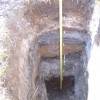 Soil is the most important building block of a healthy, attractive landscape, serving many important physical, chemical, and biological functions. Soil provides a physical substrate for plant support and holds nutrients and water for plant use. It also facilitates groundwater recharge (water moving from surface water to groundwater) and provides long-term storage for organic matter. Soil also provides a habitat for microorganisms that aid in the transformation and availability of nutrients. Soil is an integral part of any ecosystem, but urbanization often changes soils in ways that negatively affect plant development. Soils in urban areas may have reduced water infiltration, resulting in increased runoff and increased potential for nutrient losses. Homeowners in urban areas often overcompensate for poor planting conditions by applying inappropriate amounts of fertilizer and water. These practices eventually lead to nutrient losses through stormwater runoff or soil leaching, and these lost nutrients negatively impact groundwater and ecosystems in nearby springs, streams, and water bodies. This 6-page fact sheet was written by George Hochmuth, Laurie Trenholm, Esen Momol, Don Rainey, Claire Lewis, and Brian Niemann, and published by the UF Department of Soil and Water Science, November 2013.
Soil is the most important building block of a healthy, attractive landscape, serving many important physical, chemical, and biological functions. Soil provides a physical substrate for plant support and holds nutrients and water for plant use. It also facilitates groundwater recharge (water moving from surface water to groundwater) and provides long-term storage for organic matter. Soil also provides a habitat for microorganisms that aid in the transformation and availability of nutrients. Soil is an integral part of any ecosystem, but urbanization often changes soils in ways that negatively affect plant development. Soils in urban areas may have reduced water infiltration, resulting in increased runoff and increased potential for nutrient losses. Homeowners in urban areas often overcompensate for poor planting conditions by applying inappropriate amounts of fertilizer and water. These practices eventually lead to nutrient losses through stormwater runoff or soil leaching, and these lost nutrients negatively impact groundwater and ecosystems in nearby springs, streams, and water bodies. This 6-page fact sheet was written by George Hochmuth, Laurie Trenholm, Esen Momol, Don Rainey, Claire Lewis, and Brian Niemann, and published by the UF Department of Soil and Water Science, November 2013.
http://edis.ifas.ufl.edu/ss593